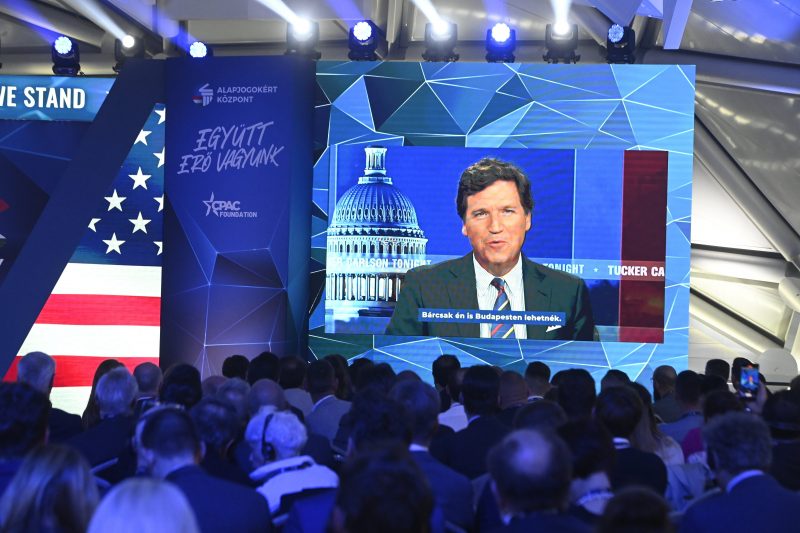Books about Donald Trump — dozens of which have been written in the past eight years — are often replete with new insights that further flesh out our understanding of the former president and his rise to power. Few quotes, though, offer as blinding a revelation as one offered in Peter Baker and Susan Glasser’s “The Divider.” It’s not about Trump, really, as much as it is about Fox News’s response to Trump’s emergence in 2015.
Baker and Glasser describe the concern Fox News founder and president Roger Ailes expressed as the first debate of the 2016 presidential nominating contest approached.
“What Ailes saw in Trump that he did not see in any other Republican politician of recent years,” they write, “was someone who connected with the Fox audience even more than Fox did.”
This proved to be prophetic. In that first debate, the Fox News moderators tried to trip up Trump, pressing him on his past rhetoric about women and his loyalty to the party. He parried the attacks easily. In short order, the channel took a keep-your-enemies-close approach, figuring that sharing a base with Trump was better than losing viewership. Fox News viewers were soon the most loyal supporters of the president.
Then Trump lost. Senior employees at Fox, including Rupert Murdoch and host Tucker Carlson, were privately eager to turn the page. Both Murdoch and Carlson mused to others that Trump would soon be out of the network’s hair. Before that could happen, though, Fox News needed to navigate the interregnum, the lame-duck period in which Trump and the channel were engaged in a tug-of-war for their shared base’s loyalty. With some election-fraud-related difficulty, they did so.
In part, that was because of Carlson. With Trump sidelined both by his election loss and his post-Capitol-riot muffling on social media, Carlson’s star began to shine more brightly. His was the most-watched prime time cable-news show last year. Sean Hannity was the host most closely defined with the Trump presidency, but Carlson was the face and voice of the post-presidency.
And he knew it.
Carlson was given a bigger platform in the Fox universe at the tail end of the Trump administration, and he used it to champion a variety of causes that diverged from the rest of the network. He elevated baseless conspiracy theories about the causes of the Capitol riot as he sought to shift blame from right-wing rioters to government-backed provocateurs. He railed against U.S. support for Ukraine against Russia, becoming a darling of Russian media in the process.
Now imagine you’re Fox News. It’s 2022, and you’ve managed to weather the transition from Trump to President Biden, becoming the “loyal opposition” to the Democratic president. But with the threat posed by Trump still simmering, there’s a new, competing power center emerging: your own host.
In an interview with CNN’s Anderson Cooper this week, a former producer on Carlson’s show, Abby Grossberg, described how Carlson and his team were aware of that power.
She was surprised Carlson was fired, she told Cooper, because “I thought his team was invincible. And they believed they were, too, by the way that they behaved.” Grossberg is suing Fox for discrimination.
Cooper asked Grossberg how far Carlson’s sense of political power extended.
“I have messages I was just looking at today saying, ‘We are the most powerful political platform in the Republican Party,’” Grossberg said, referring to messages from Carlson’s executive producer, Justin Wells. “And they acted that way, especially leading up to the 2022 midterms.”
She described interactions with elected officials who worried that Carlson would upend their campaigns in just one interview.
And, she said, it went further.
“They believed that he could broker who was speaker, House speaker,” Grossberg told Cooper. “He wanted to do that live on air.”
She described a plan, allegedly articulated by Wells, that would have Carlson interview Rep.-elect Kevin McCarthy (R-Calif.) shortly before the Republican caucus met to (eventually) select McCarthy as speaker. It involved a commitment from McCarthy about a select committee focused on alleged misbehavior by federal law enforcement — a select committee than has since been instantiated.
“Fortunately for McCarthy’s sake, he said no,” Grossberg said. “But he did call Tucker the next day from his office with Rep. Thomas Massie (R-Ky.) and had agreed to some of Tucker’s terms, according to a text that Tucker had sent me. And he said that was a win.”
Rep. Matt Gaetz (R-Fla.), who Grossberg described as being an ancillary part of the effort to finalize the speaker vote on-air, rejected the idea that such a scheme existed.
“This seems to call into question many of the claims made by this disgruntled employee,” he wrote on Twitter.
Carlson was nonetheless flexing this power on air in other ways. At one point, he submitted a questionnaire to Republican presidential candidates, soliciting their views on the war in Ukraine. For the candidates, the offer presented a conundrum with three possible resolutions. You could ignore Carlson and invoke his wrath. You could respond in a way that conflicted with Carlson’s approach and see the same outcome. Or you could play along and ingratiate yourself with his audience — but let Carlson guide your foreign-policy positions. Florida Gov. Ron DeSantis (R) chose that third option and got hammered as a result.
For Carlson, though, it was win-win. Flex being “the most powerful political platform in the Republican Party.” Get more people to espouse his Ukraine-skeptical approach.
But it’s not clear that’s what Fox wanted, certainly. Is it useful for the network to have a prime time host using the platform you’re giving him in a way that undermines or destabilizes other elements of the GOP? Had Carlson become another person who “connected with the Fox audience even more” than the network overall?
Ostensibly, Carlson’s firing was a function of the messages unearthed during the discovery phase of the massive lawsuit the company faced for its embrace of election-fraud conspiracies. But the company had long stood behind Carlson even after his most noxious pronouncements and despite his freelancing on conspiracy theories. Were they not aware of the sexist climate Grossberg alleges? Or was that not the reason at all?
It wasn’t just Carlson that was fired, mind you. So was Justin Wells, his executive producer, the one who Grossberg told Cooper was the source of a lot of the scheming. Maybe his firing was about the workplace Wells allowed. Or maybe it was about power.
It certainly seems as though Carlson might see his ouster through that lens. The Washington Post reported on Thursday that he was exploring the idea of hosting his own Republican primary debate, an effort that would mean sacrificing income Fox is otherwise obligated to provide.
Maybe this was the deal all along: Carlson got money and a platform from Fox News as long as he remained subjugated to the company. When he starts competing with the network for power, the deal’s off.



























